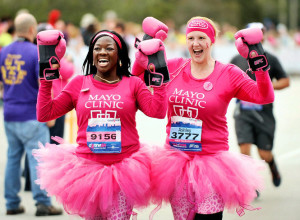When my mother got diagnosed with ovarian cancer in 2002, it didn’t occur to me to be angry. As long as she was battling, I was her cheerleader. But after my brother died from >>Ewing’s Sarcoma in the spring of 2003, it felt like my mother stopped fighting.
Eleven months after my brother passed away, I lost my mother, too. And then my grief turned to blame. I forgot about her hysterectomy, rounds of chemotherapy, and the two surgeries she had to remove her organs.
I focused on the moment before my brother’s funeral when she said she had nothing left to live for, how after that she decided to forego further chemotherapy, and, how maybe, it was her fault that she developed cancer in the first place. After all, she had spent the better part of her life being sedentary and overweight with a poor diet.
Once the haze of constant grief and anger cleared, I knew the cancer and my mother’s death were not her fault. My brother’s cancer was not his fault. And, you know what? For all of my other relatives and friends that have battled or are battling cancer, it’s not their faults either.
While there may have been actions my mother could have taken to live a healthier life, >>almost all of the time, cancer is random and she fought for as long as she could, mostly for my sister and me. Rationally, I understood that from the beginning, but blame gave me something to do other than grieve.
In hindsight, as temporarily satisfying as it was to get mad, there were a million more constructive outlets for my grief. For >>World Cancer Day, to honor my mother and the others affected by this disease, I want to share my outlets with you. They all come down to taking action.
- Get your yearlies done. Go to the doctor and get your pap smear, mammogram, and skin exam. Give yourself a breast exam every month. Don’t wait to make an appointment with your physician if you feel something isn’t right, and get a second opinion if you don’t feel confident about the first one.
- Get vaccinated. Find out if you (and/or family members) should get vaccinated for HPV or Hepatitis B.
- Take care of your body. The healthier you are, the better chance you have of beating the disease. Stop smoking, reduce alcohol consumption, wear sunscreen, and eat more vegetables and high fiber foods.
- Exercise. You don’t have to run a marathon; walking for at least half an hour a day (or even three times a day in ten minute increments) is a great place to start. Of course, if you want to run a marathon, do it! I joined >>Team in Training for the Leukemia and Lymphoma Society. As an out of shape person, I completed two half marathons and one full one while raising money for life saving treatments and becoming part of a supportive community that understood my pain. Joining Team in Training gave me a vehicle for raising awareness. Any group you join will allow you to affect positive change on a national and global scale.
Despite its pervasiveness, we can make cancer less prevalent and more treatable in our world. I might not find the cure, and likely neither will you. But today, World Cancer Day, is a great time to stop wallowing and start healing.
>> Jennifer Brick is a writer and teacher in Durham, North Carolina. She earned her Masters of Fine Arts in Creative Nonfiction from Goucher College. Follow her on Twitter @jenbrickwrites.
Jennifer Brick is a writer and teacher in Durham, North Carolina. She earned her Masters of Fine Arts in Creative Nonfiction from Goucher College. Follow her on Twitter @jenbrickwrites.

There are no comments
Add yours